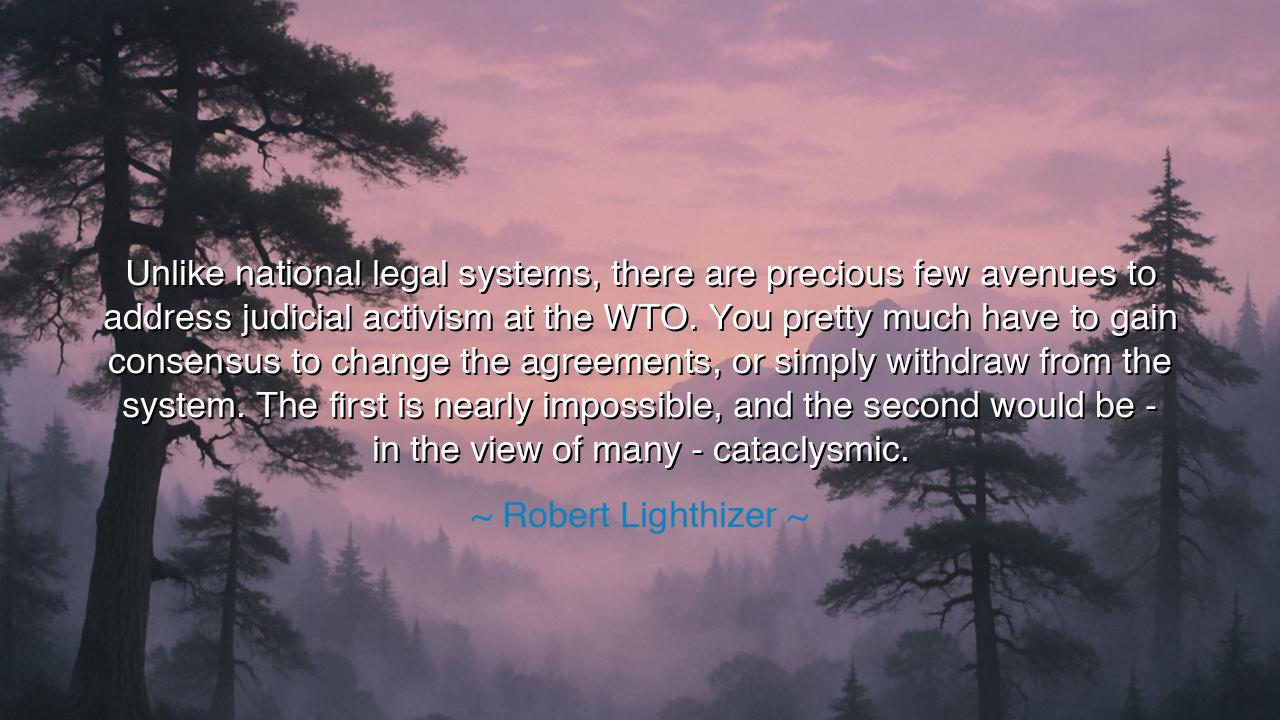
Unlike national legal systems, there are precious few avenues to
Unlike national legal systems, there are precious few avenues to address judicial activism at the WTO. You pretty much have to gain consensus to change the agreements, or simply withdraw from the system. The first is nearly impossible, and the second would be - in the view of many - cataclysmic.






Hear the words of Robert Lighthizer, forged in the fire of trade wars and negotiations among nations: “Unlike national legal systems, there are precious few avenues to address judicial activism at the WTO. You pretty much have to gain consensus to change the agreements, or simply withdraw from the system. The first is nearly impossible, and the second would be—in the view of many—cataclysmic.” These words ring with both frustration and gravity, for they reveal the tension at the heart of global governance: how shall nations be bound together by law, when each holds its own sovereignty close, and yet all depend upon one another?
When Lighthizer speaks of judicial activism at the WTO, he warns of judges and panels who, in interpreting trade agreements, may create new obligations not agreed upon by the nations themselves. In national systems, there are checks—parliaments, congresses, courts of appeal. But in the World Trade Organization, where hundreds of nations are yoked together by fragile consensus, the tools to restrain such activism are few. Thus, a judgment that expands or distorts agreements may bind nations in ways they never consented to, tilting the balance of sovereignty.
The paths he describes are stark: either gain consensus among all members to change the agreements, or withdraw from the system entirely. The first, he calls “nearly impossible,” for to gain consensus among so many nations, each with its own interests and rivalries, is like trying to still the sea with one’s hands. The second, he names “cataclysmic,” for to abandon the WTO would unravel decades of hard-woven trade rules, plunging the world back into the chaos of protectionism and tit-for-tat tariffs. His words reveal the dilemma of our age: trapped between stagnation and collapse, nations struggle to find balance.
History offers us a vivid parallel in the tale of the League of Nations after World War I. It was born with high hopes, designed to bind nations in peace through collective rules. Yet because its decisions required consensus and because powerful nations sometimes withdrew when displeased, it proved too weak to stop aggression and too fragile to endure. The League’s collapse opened the path to greater catastrophe in World War II. Lighthizer’s warning echoes this lesson: that fragile systems, if not reformed, may one day shatter, and their breaking may bring devastation.
The deeper meaning of his words is this: global systems of law are both indispensable and perilous. Indispensable, because trade binds nations together, weaving a web that sustains economies and livelihoods across the earth. Perilous, because these systems rest upon the will of nations to obey rules they cannot fully control. When the rules seem unjust or beyond accountability, resentment grows, and the entire structure trembles. Yet to abandon the system is to unleash chaos, where every nation acts alone, and conflict becomes inevitable.
This truth is both sobering and heroic. Sobering, because it reminds us that human governance—even at the highest levels—remains imperfect, full of compromise and frustration. Heroic, because it challenges leaders and peoples to rise above narrow interests, to strengthen systems that are fair, transparent, and accountable. To do this is no small task; it requires patience, diplomacy, courage, and a vision of the common good that transcends borders.
Children of tomorrow, let this lesson take root in your hearts: when you encounter flawed systems, do not rush to destroy them in anger, nor accept their injustices in silence. Strive instead for reform, for balance, for wisdom that strengthens without shattering. In your communities, in your nations, and in the world, remember that cooperation, though difficult, is the shield against chaos. Support leaders who seek fairness in global rules, who defend sovereignty without undermining unity, who labor not only for their nation’s gain but for the peace of all.
Thus, the wisdom of Lighthizer’s words endures: that the WTO, like all human systems, is fragile yet essential, flawed yet vital. To abandon it would be ruin; to reform it requires Herculean effort. But such is the labor of every generation—to preserve what sustains order, while correcting what leads to injustice. Let this teaching guide you, for in it lies the balance between strength and peace, sovereignty and cooperation, law and liberty.






AAdministratorAdministrator
Welcome, honored guests. Please leave a comment, we will respond soon